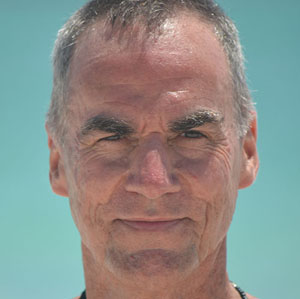
When I think of the City of Boston there are a few things that quickly spring to mind: the storied franchises and immortal legends of the Red Sox, Bruins, and Celtics; the irresistible delicacies of Boston Cream Pie, and Sam Adams on tap; the ebullient backdrop for television hits, Cheers and Boston Legal; and perhaps most indelibly, the home of the iconic Boston Marathon.
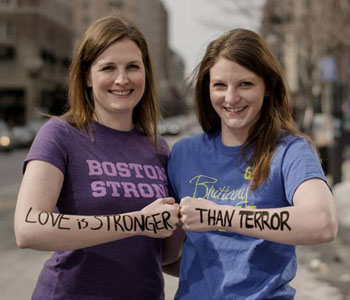
The Boston Marathon has the distinction of being the oldest annual marathon in the world. Occurring on Patriot’s Day each year – the American commemoration of the battles of Lexington and Concord in 1775 – the April 21, 2014 event was the 118th running and the first since the shocking events a year ago, when three people were killed and more than 260 injured in two terrorist bomb blasts just meters from the finish line. With interminable spirit and ‘Boston Strong’ defiance, 36,000 proud and determined registrants took to the streets for this year’s event – an increase of 9,000 from the prior year.
As a casual runner who has lumbered to the finish line of the occasional 5K charity event, the notion of running a distance of 26.2 miles (42.2 kilometers) – at any age – is staggering. It is perhaps for that reason, the story of 60-year-old, Bruce Anderson of London, Ontario, is such an enviable example of personal fitness and training discipline.
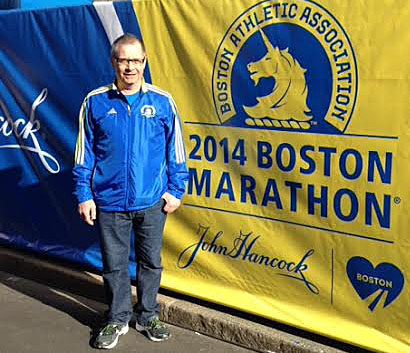
For Anderson – who works full-time as a Territory Underwriter for insurer, Travelers Canada – running is a passion he picked up 25 years ago as a commitment to health and fitness. This year’s run in Boston was his 15th marathon in the past 10 years. He is a longtime member of the London Pacers Running Club and does most of his training in the early morning before work, with longer runs on weekends. As a self-described “middle-of-the-packer,” his first marathon was 10 years ago in Philadelphia, where he posted a time of just under four hours, at age 50. His best time was 3:40:03 a few years ago at the Detroit Marathon layout which actually spans two countries. “Detroit is my favourite marathon course. We cross the bridge into Canada and take the tunnel back to the U.S. It’s unique,” said Anderson.
He has participated in the Boston Marathon three times in the past 10 years. This year’s entry evolved out of a casual comment made in June 2012 to a friend and training partner as Anderson contemplated an upcoming milestone birthday. “I think I’d like to experience Boston one more time at age 60,” he mused. Within a day they were both signed up for Hamilton’s November 2012 Road 2 Hope Marathon in an effort to qualify for Boston.
A few weeks into training, injuries sidelined his cohort who ultimately pulled out of the qualifier, leaving Anderson to carry out a rigorous training schedule largely on his own. Qualification times for Boston are set as unofficial targets to be confirmed about six months prior to race date. On the assumption of the 3:55:00 or better requirement in the Male 60-64 bracket, Anderson focused his training efforts and set his sights on a time of 3:50:00 at the Hamilton qualifier, to leave a buffer.
November 4, 2012 was a cold, windy day in Hamilton and the race did not start off well for Anderson. “My body was not adjusting and I couldn’t get the heart rate to settle. I didn’t panic, but I was a little worried,” he explained. Anderson plans a marathon in meticulous detail, “I’m very focused when running a race. I know my planned splits and attempt to be precise. I allow for a few distractions, but I’m focused on the road ahead and try to take the shortest line through the bends and curves. I attack the hills, both up and down, and am able to hold a very steady pace per kilometer.” About 10 kilometers in, Anderson caught a long downhill stretch and settled into a good rhythm. He finished with a time of 3:51:08 and his entry application for Boston was confirmed in September 2013.
*************************
Training had progressed well through the summer of 2013 with the serious preparation work planned to start by mid-December, about four months before the event. But Anderson was about to be dealt a complication he had not prepared for, and one that would threaten the dream of Boston at age 60.
Towards the end of August while doing lighter, maintenance runs, Anderson noticed some pain in the right hip and decided to take a break to allow for healing. After two weeks and some physio, the condition – which would eventually be diagnosed as sciatica – had worsened. By late Fall, he was virtually incapacitated, walking with the assistance of crutches.
It wasn’t until mid-November that Anderson was able to begin the slow process of rebuilding muscle and stamina on the recumbent bike and elliptical equipment. By the end of December, he had resumed some light treadmill work which progressed in intensity through the end of January. It also resulted in some knee strain requiring additional rest and a decision to pull back to elliptical and stationary bike training, alternatives lighter on knee impact.
March 2nd was Anderson’s first outdoor run in the seven months since the onset of sciatica, which he followed with an accelerated schedule culminating in a couple of solid training runs in 35K range, by early April. With 15 days before the Boston he was into “full taper.” Though excited to “toe the line” on the 21st, he was not anticipating any ‘personal bests’ given the physical challenges he’d faced and the abbreviated training schedule that ensued. Instead, his expectations were modified to simply “enjoy the moment, take in the crowds, and savour the finishing stretch on Boylston.”
*************************
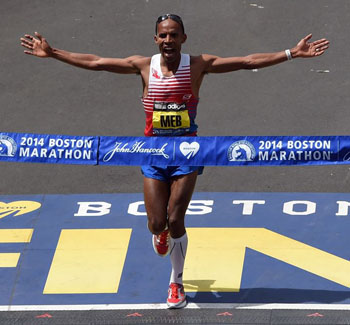
The Boston Marathon is carefully coordinated into a series of staggered start times which began this year at 8.50 a.m. for the faster-paced wheelchair and handcycle entrants, followed by the elite female and male runners at 09.32 a.m. and 10.00 a.m. respectively. From there, the general population falls into four waves based on qualifying times, denoted by the colour of the numbered bib assigned. Each wave is further divided into nine corrals of 1,000 entrants who are so identified by a unique bib number. Thus, by the time Anderson hit the starting line just after 11.00 a.m., many of the wheeled participants were across the finish line and the leaders in the elite women and mens’ groups, nearing the end of the 42.195 kilometer course.
In a popular and fitting outcome following last year’s tragedy, the winner in the Men’s division was 38-year-old, Meb Keflezighi of the United States, with a time of 2:08:37. The first American male since Greg Meyer in 1983, to win the Boston Marathon. The Women’s division was won by Rita Jeptoo of Kenya, with a divisional course record of 2:18:57 and her third title in Boston.
*************************
Anderson’s first 15K’s were not far off the pace of his qualifying race and had him projecting to finish in the 4:00 hour range. But his expectations for this race were modest after the extended layoff and compressed training schedule following his injuries. “My distance roadwork in early April had me tracking at about five hours,” he said. “The best case scenario for Boston would have been to come in about 4:30. I actually started out a little too fast and had to pull back a bit.”
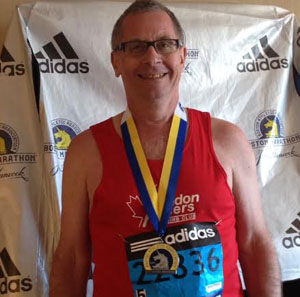
“The remaining 27 kilometers, and especially the last 10, were tough,” explained Anderson – whose five kilometer splits averaged in the 36 minute range for the balance of the run. “Temperatures were over 70 degrees and I was taking in fluids every mile to keep from dehydrating. There was a light headwind, but at least it cooled you down.”
Anderson was pleased under the circumstances that he managed to conquer the notorious “Heartbreak Hill” – the last gruelling test Boston throws at runners with about 8 kilometers to go. With a finishing time of 4:54:13, he points out, “it was a long day, that’s the longest I’ve been out there for any of the marathons I’ve completed.”
But Anderson keeps it all in perspective. Asked whether he had any plans to come back to run Boston, he said, “I think that was my last hurrah for Boston. My whole objective was to qualify and enjoy that trip through the crowds on Boylston Street one more time at age 60. Considering how things looked a few months ago, I’m happy to have finished.”
The Tuesday following the race was a day for Anderson and his wife to walk the streets of Boston and enjoy the city. They found themselves at a famous Beacon Street bar called Cheers – the original inspiration for the television series. There, Anderson ordered a Sam Adams Boston Lager and chatted with some locals about his running of the Boston Marathon.
It’s hard to imagine a more suitable ending to a great accomplishment in Boston.
*************************